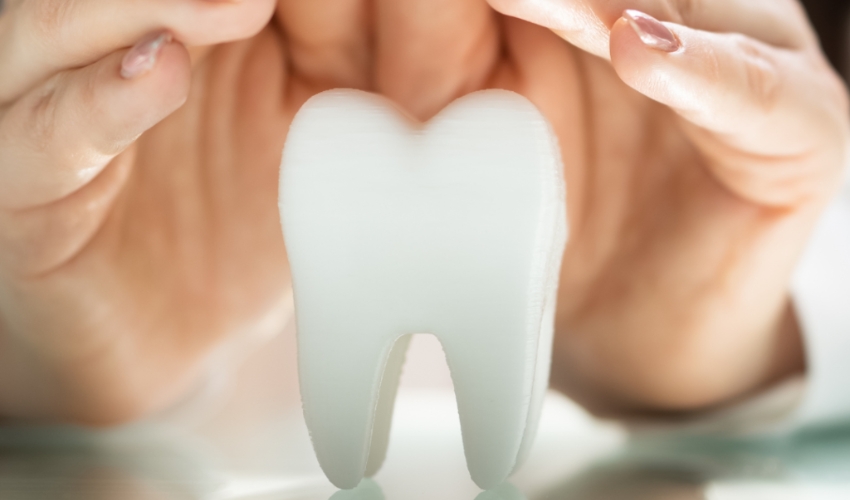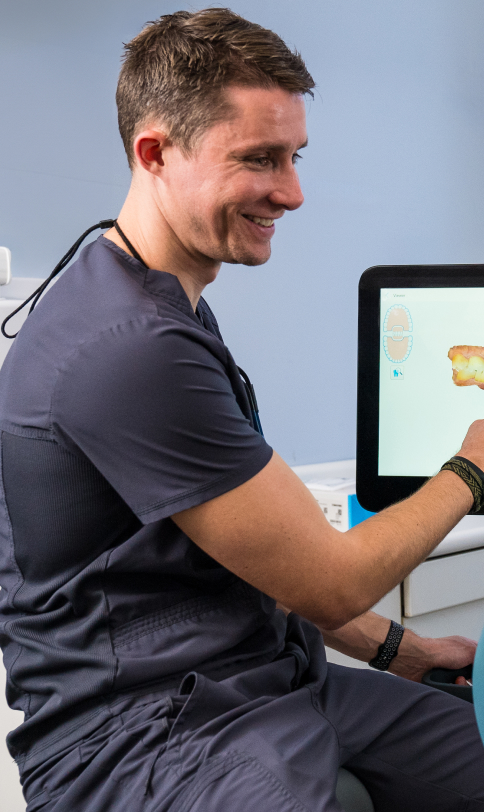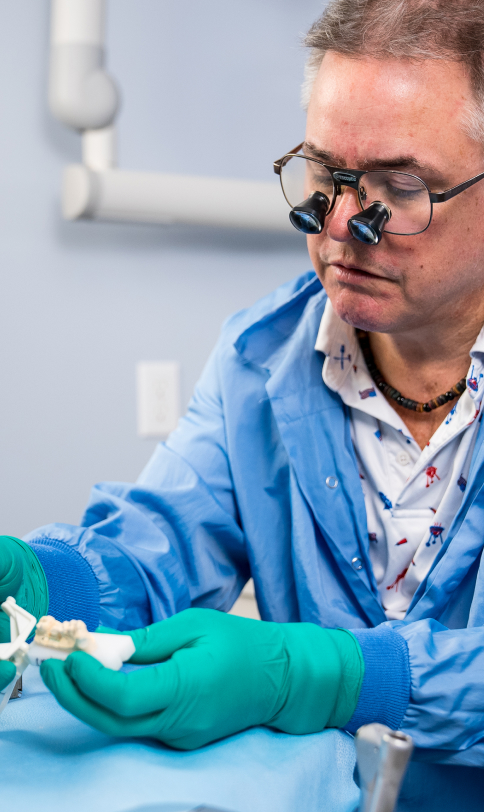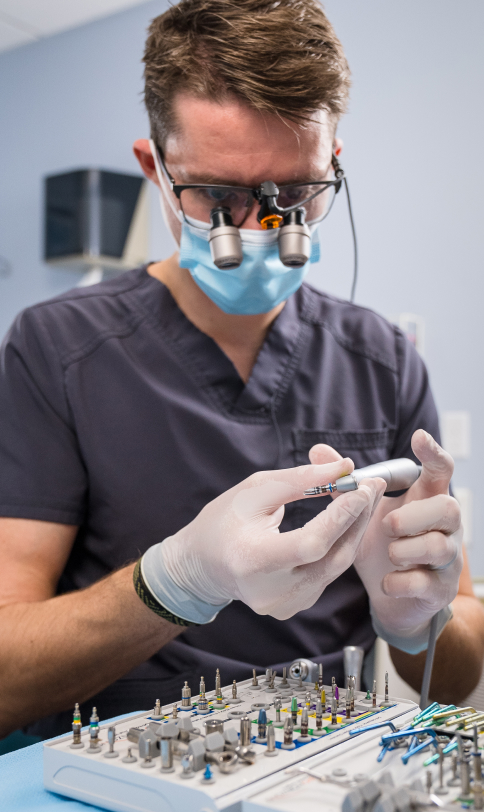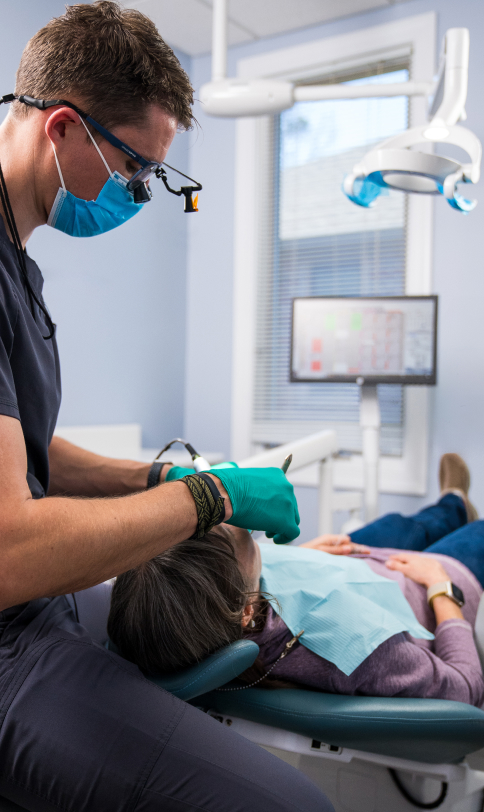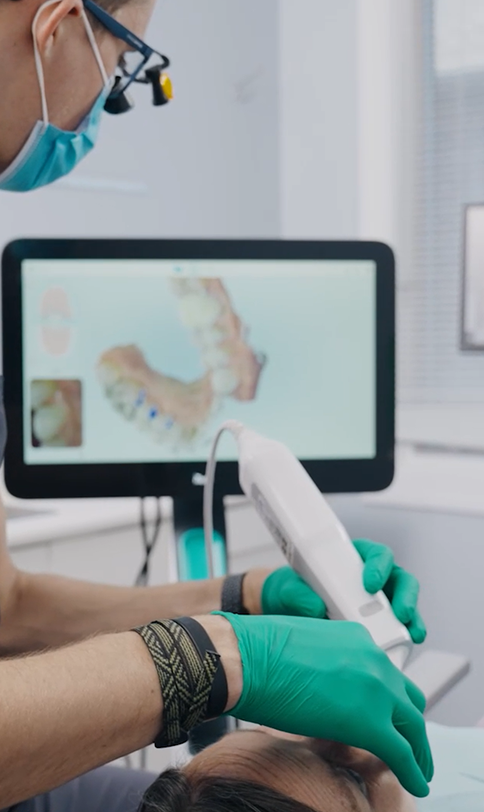
Can Wisdom Teeth be the Cause of My Headache?
By Legacy Dental
Your late teens or early twenties often bring exciting milestones, but they can also usher in unexpected challenges, like wisdom teeth. These third molars, the last to emerge, can stir up more than just dental discomfort. For many, they spark nagging headaches or even debilitating migraines, leaving people wondering: Can wisdom teeth cause headache pain? The answer is a resounding yes, and the connection is more intricate than you might think.
In this article, we’ll dive deep into how wisdom teeth can disrupt your life with headache pain, explore their science, and offer practical solutions to find relief. Understanding this link could be a game-changer if you’re battling persistent head pain or are simply curious about your oral health. Let’s unravel the mystery and empower you to take control of your well-being with insights into expert care, such as Wisdom Teeth Extraction in Cary, for those seeking answers close to home.
What Is a Migraine?
A migraine is more than just a headache—it’s a neurological condition characterized by intense throbbing pain, often on one side of the head. Symptoms include nausea, light sensitivity, and visual disturbances. While triggers vary (including stress, hormones, and diet), emerging research highlights an unexpected factor: wisdom teeth. Pressure from impacted or misaligned molars can activate the trigeminal nerves, which are central to migraine pathways.
Recognizing Migraines Caused by Wisdom Teeth
Not all migraines stem from wisdom teeth, but specific patterns may signal a dental link:
- Location: Pain is concentrated near the jaw, temples, or behind the eyes.
- Timing: Headaches worsen after eating, yawning, or lying down.
- Associated Symptoms: Jaw stiffness, earaches, or facial tingling 14.
For example, a patient reported migraines that spiked after chewing, which resolved post-extraction of impacted wisdom teeth.
How Do Wisdom Teeth Cause Migraines?
The link between wisdom teeth and migraines primarily stems from pressure and inflammation. Wisdom teeth are the last to erupt, and modern jaws often lack the space to accommodate them. When there’s no room, these teeth can become impacted, partially or entirely, beneath the gumline. This impaction creates pressure on surrounding teeth, nerves, and jaw muscles, which can radiate pain to your head.
Here’s how it happens:
- Nerve Irritation: Impacted wisdom teeth can compress nerves in the jaw, sending pain signals to the brain that manifest as migraines.
- Muscle Tension: The strain from misaligned or crowded teeth can cause jaw clenching or grinding, leading to tension headaches that mimic migraines.
- Sinus Pressure: Upper wisdom teeth sit close to sinus cavities. Impaction or infection can cause sinus inflammation, triggering headaches that feel like migraines.
- Inflammation: Infections like pericoronitis (gum inflammation around a partially erupted tooth) can spread discomfort to nearby tissues, amplifying head pain.
Studies suggest that impacted wisdom teeth are a common cause of orofacial pain, with some estimates indicating that up to 85% of people may need their wisdom teeth removed due to complications. This pressure cooker in your mouth can turn a minor annoyance into a major headache.
Signs That Headaches May Be Caused by Wisdom Teeth
Wondering if your wisdom teeth are to blame for your headaches? Keep an eye out for these warning signs:
- Swollen Gums: Indicative of infection or impaction
- Jaw Pain with Headaches: Tension from crowded molars.
- Earaches or Sinus Pressure: Upper wisdom teeth pressing on sinus cavities.
- Pain When Chewing: Aggravated by pressure on misaligned teeth.
- Morning Headaches: Nighttime teeth grinding (bruxism) due to jaw misalignment.
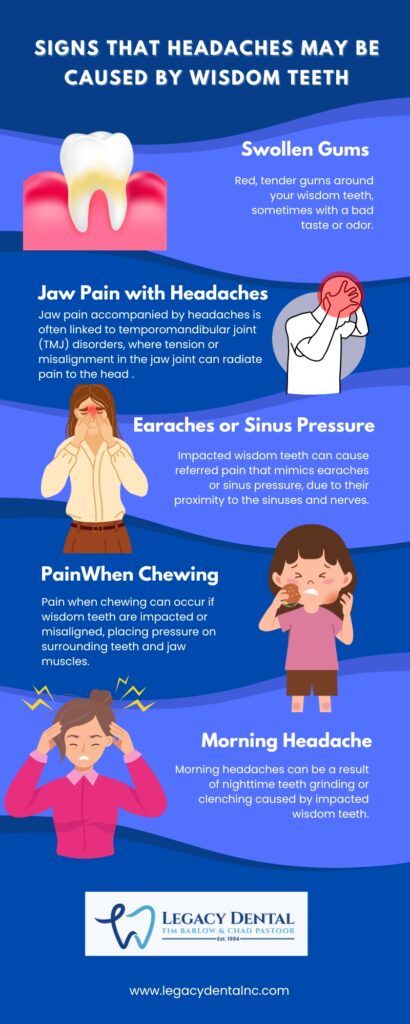
Other Problems Associated with Wisdom Teeth
Headaches are just the tip of the iceberg regarding wisdom tooth troubles. These molars can cause a cascade of oral health issues, including:
- Tooth Decay: Wisdom teeth are hard to clean, making them prone to cavities that can spread to neighboring teeth.
- Gum Disease: Partially erupted teeth create pockets where bacteria thrive, leading to infections like pericoronitis.
- Cysts or Tumors: In rare cases, impacted teeth can form fluid-filled cysts, damaging the jawbone or nearby teeth.
- Crowding: Wisdom teeth can push other teeth out of alignment, undoing years of orthodontic work.
- Infections: Bacteria trapped around impacted teeth can lead to painful abscesses or systemic diseases.
These complications highlight why addressing wisdom tooth issues early—potentially through Wisdom teeth extraction in Cary—is crucial for overall health.
How to Relieve Headaches from Wisdom Teeth
Short-Term Relief:
- Saltwater Rinses: Reduce inflammation and bacteria 17.
- OTC Pain Relievers: Ibuprofen or aspirin for pain and swelling.
- Thermotherapy: Alternate ice packs and warm compresses to relax muscles.
Long-Term Solutions:
- Wisdom Teeth Extraction in Cary: Permanent relief for impacted or infected molars.
- Orthodontic Evaluation: Address bite issues caused by shifting teeth
Find Relief with Legacy Dental Cary
At our dental clinic, our team combines cutting-edge technology with personalized care. Whether you need monitoring, extraction, or post-surgery support, we prioritize your comfort. Serving Cary for over a decade, we’ve helped countless patients reclaim their lives from wisdom teeth-induced pain.
Conclusion
Wisdom teeth may seem like a rite of passage, but they can bring more than just growing pains—they can trigger headaches and migraines that disrupt your daily life. From nerve irritation to jaw tension, these third molars can wreak havoc when they don’t fit properly in your mouth. Recognizing the signs, like jaw pain, swollen gums, or persistent head pain, is crucial to addressing the root cause before it escalates.
Thankfully, you’re not stuck enduring the discomfort. Simple at-home remedies can provide temporary relief, but professional care is key for lasting solutions. Whether through a Wisdom Teeth Extraction in Cary or other treatments, a dentist in Cary can help you reclaim your comfort and confidence. Don’t let wisdom teeth steal your peace—take action today, and let your smile shine without the shadow of headache pain.
Frequently Asked Questions
Yes, it’s normal to experience mild headaches after extraction due to jaw tension, inflammation, or anesthesia effects. These typically fade within a few days. If headaches persist or worsen, contact your dentist to rule out complications like infection or dry socket.
Healthy, fully erupted wisdom teeth can aid chewing and maintain facial structure. However, if they’re causing pain, crowding, or other issues, removal is often the better choice to prevent long-term problems.
Extraction is advised if wisdom teeth are impacted, causing pain, infections, decay, or crowding. Dentists often recommend removal in your late teens or early twenties, when roots are less developed, for easier recovery.
Delaying extraction can lead to severe infections, cysts, tooth decay, or damage to adjacent teeth. Chronic headaches may worsen, and surgery could become more complex as roots grow deeper.
Absolutely. Partially impacted wisdom teeth break through the gumline but don’t fully erupt, creating spaces for bacteria to thrive. This can cause pain, swelling, and headaches, often requiring removal.


